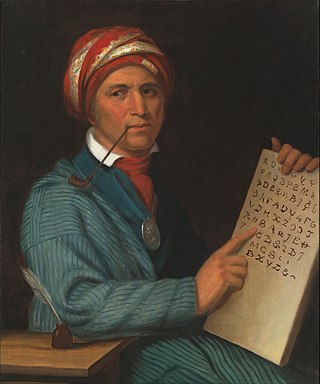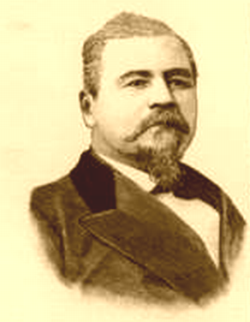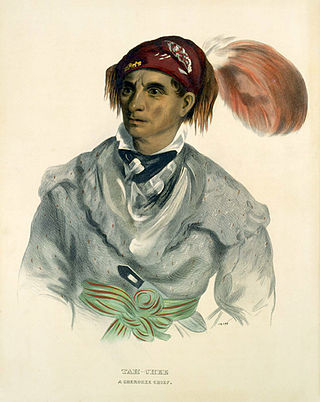Further reading
- "John Brown" in A Cherokee Encyclopedia (2007) by Robert J. Conley, Albuquerque: University of New Mexico Press, p. 41
John Brown, formerly judge of the Chickamauga District of the Cherokee Nation East, was elected Principal Chief of the Cherokee Nation West 22 April 1839, after the Old Settlers decided to elect new officers to strengthen their position vis-a-vis the Latecomers under John Ross, in place of then Principal Chief John Looney. He served until a majority of the Old Settlers decided his administration had not gone far enough to accomplish a compromise with the Ross party, and re-elected his predecessor John Looney in his place that July.
Brown's Tavern in Lookout Valley, Chattanooga, Tennessee, is so-named because it was once his, part of a complex of businesses that included a riverboat landing for the tavern and inn, Brown's Ferry a mile or more downstream, a large farm, and a mill. Now a private home, it is on the National Register of Historic Places.

The Cherokee are one of the indigenous peoples of the Southeastern Woodlands of the United States. Prior to the 18th century, they were concentrated in their homelands, in towns along river valleys of what is now southwestern North Carolina, southeastern Tennessee, edges of western South Carolina, northern Georgia, and northeastern Alabama.

John Ross was the Principal Chief of the Cherokee Nation from 1828 to 1866; he served longer in that position than any other person. Described as the Moses of his people, Ross influenced the nation through such tumultuous events as the relocation to Indian Territory and the American Civil War.

Elias Boudinot, also known as Buck Watie) was a writer, newspaper editor, and leader of the Cherokee Nation. He was a member of a prominent family, and was born and grew up in Cherokee territory, now part of present-day Georgia. Born to parents of mixed Cherokee and European ancestry and educated at the Foreign Mission School in Connecticut, he became one of several leaders who believed that acculturation was critical to Cherokee survival. He was influential in the period of removal to Indian Territory.

Brigadier-General Stand Watie, also known as Standhope Uwatie, Tawkertawker, and Isaac S. Watie, was a Cherokee politician who served as the second principal chief of the Cherokee Nation from 1862 to 1866. The Cherokee Nation allied with the Confederate States during the American Civil War and he was the only Native American Confederate general officer of the war. Watie commanded Indian forces in the Trans-Mississippi Theater, made up mostly of Cherokee, Muskogee, and Seminole. He was the last Confederate States Army general to surrender.

The Treaty of New Echota was a treaty signed on December 29, 1835, in New Echota, Georgia, by officials of the United States government and representatives of a minority Cherokee political faction, the Treaty Party.

New Echota was the capital of the Cherokee Nation in the Southeast United States from 1825 until their forced removal in the late 1830s. New Echota is located in present-day Gordon County, in northwest Georgia, 3.68 miles north of Calhoun. It is south of Resaca, next to present day New Town, known to the Cherokee as Ꭴꮝꮤꮎꮅ, Ustanali. The site has been preserved as a state park and a historic site. It was designated in 1973 as a National Historic Landmark District.
James Vann was an influential Cherokee leader, one of the triumvirate with Major Ridge and Charles R. Hicks, who led the Upper Towns of East Tennessee and North Georgia as part of the ᎤᏪᏘ ᏣᎳᎩ ᎠᏰᎵ. He was the son of ᏩᎵ (Wali) Vann and Indian trader Joseph John Vann. He was born into his mother's Clan, ᎠᏂᎪᏓᎨᏫ.
Black Fox, also called Enola, was a Cherokee leader during the Cherokee–American wars. He was a signatory of the Holston Treaty, and later became a Principal Chief of the Cherokee Nation.

William Potter Ross, also known as Will Ross, was the Principal Chief of the Cherokee Nation 1866-1867 and 1872-1875. Born to a Scottish father and a mixed-blood Cherokee mother, he was raised in a bilingual home. Ross attended English-speaking schools. He attended Princeton University, where he graduated first in his class in 1844.
Charles Renatus Hicks (Cherokee) was one of the three most important leaders of his people in the early 19th century, together with James Vann and Major Ridge. The three men all had some European ancestry, as did numerous other Cherokee, but they identified as Cherokee. The people had a matrilineal kinship system, so children were considered born into their mother's family and clan.

Dennis Wolf Bushyhead was a leader in the Cherokee Nation after they had removed to Indian Territory. Born into the Wolf Clan, he was elected as Principal Chief, serving two terms, from 1879 to 1887.
This is a timeline of events in the history of the Cherokee Nation, from its earliest appearance in historical records to modern court cases in the United States. Some basic content about the removal of other southeastern tribes to lands west of the Mississippi River is included. In a series of treaties, these tribes ceded land to the United States.
William Abraham Hicks was a wealthy farmer and leader of the Cherokee Nation. In a time of crisis, the National Cherokee Council named Hicks the interim Principal Chief in October 1827. He served in that capacity until October 1828. Hicks succeeded his older brother Charles Hicks, who died in office in January 1827, two weeks after coming to the position.

John Jolly, was a leader of the Cherokee in Tennessee, the Arkansaw district of the Missouri Territory, and Indian Territory. After a reorganization of the tribal government around 1818, he was made Principal Chief of the Cherokee Nation–West. Jolly was a wealthy slave-owning planter, cow rancher, and merchant. In many ways, he lived the life of a Southern planter.
Doublehead (1744–1807) or Incalatanga, was one of the most feared warriors of the Cherokee during the Cherokee–American wars. Following the peace treaty at the Tellico Blockhouse in 1794, he served as one of the leaders of the Chickamauga Cherokee, and he was chosen as the leader of Chickamauga in 1802.
Nunnahitsunega, or "Whitepath", was a full-blood traditionalist leader and member of the Cherokee National Council who lived at Turnip Town (Ulunyi), near the large Ellijay (Elatseyi) in the early 19th century. In 1824, influenced by the teachings of the Seneca prophet Handsome Lake, he began a rebellion against the acculturation then taking place in the Cherokee Nation, proposing the rejection of Christianity and the new constitution, and a return to the old tribal laws. He soon had a large following, whom his detractors referred to as "Red Sticks", and they formed their own council, electing Big Tiger as their principal chief.
John Looney was a Cherokee chief. As a young man, he served in the United States Army under Andrew Jackson. He later became chief of the Western Cherokee, in which capacity he negotiated with the US government and dealt with conflicts with the rival Eastern Cherokee.
The Chickamauga Cherokee refers to a group that separated from the greater body of the Cherokee during the American Revolutionary War. The majority of the Cherokee people wished to make peace with the Americans near the end of 1776, following several military setbacks and American reprisals.

William Dutch or Tahchee was a prominent leader of the Cherokee "Old Settlers" in the American West. He was renowned as a notorious enemy of the Osage tribe, and a spokesman for the Cherokee.